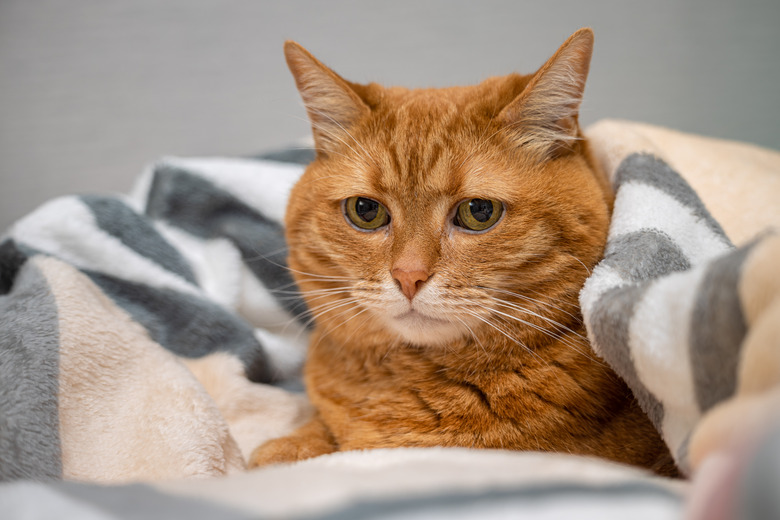Why Is My Cat Shivering?
Lately, you've noticed that your cat is shivering, and you're starting to get concerned. Cat shivering is indicative of a health issue that can be caused by several conditions. Once you learn more, you should then take your cat the veterinarian for proper treatment. This veterinarian-reviewed article explains all the different possibilities for cat shaking so you can determine how to get your cat to stop shivering and feel better.
Your cat is hypoglycemic
Your cat is hypoglycemic
Cat trembling could occur if your cat is hypoglycemic. Hypoglycemia can occur in diabetic cats who have been given insulin and not eaten, or cats that have been given too much insulin. If this happens and the cat is conscious and can swallow, rub a sugary substance like Karo syrup on their gums and offer them a meal, and then take them to the veterinary hospital. If your cat is unconscious, take them immediately to get emergency veterinary treatment. Other causes of hypoglycemia include xylitol poisoning, which is a common ingredient in gums and human foods, infection, pregnancy, cancer, and seizures.
Your veterinarian will be able to tell you if your cat is hypoglycemic by conducting a physical and checking her glucose levels. The vet may ask you about other symptoms like a loss of appetite, muscle twitching, lethargy, and unusual behavior to determine if hypoglycemia is the reason your cat is shaking.
Your cat has a fever
Your cat has a fever
Another reason cat shaking is happening is because your cat has a fever. A kitten and an adult cat's normal body temperature is between 101.0 to 102.5 degrees Fahrenheit. The other telltale signs of a fever include dehydration, lethargy, and a loss of appetite. If you suspect that your cat has a fever, get them to the vet as soon as you can.
When getting treatment, your cat's veterinarian will perform an exam, including taking your cat's temperature. Your cat may also need blood work and other tests to determine the cause of the fever. Your veterinarian will develop a treatment plan based on the results of the physical examination and tests.
Your cat is stressed or nervous
Your cat is stressed or
nervous
When your cat gets stressed out or is nervous about something, she might express it by shivering or trembling. Things that can trigger stress or anxiety in a cat include a change in the environment, another pet taking over their territory, loud noises, a visit to the groomer or veterinarian, or a lack of stimulation or things to do. In addition to shivering, your cat could show that they are stressed by going to the bathroom out of their litter box, having diarrhea, over-grooming themselves, and being more clingy than usual.
Your cat is cold
Your cat is cold
When winter hits, your cat could get cold, even if they have a lot of fur. If your cat is shivering due to cold, they may sleep near the radiator or heater or go under the covers for warmth.
You should provide your cat with plenty of warm bedding, comb your cat's fur so that it can more effectively retain heat, brush your cat regularly to maintain healthy fur and skin, offer a high quality diet and make sure they're drinking plenty of water. Make sure you keep your cat indoors when it's cold outside.
Your cat is in pain
Your cat is in
pain
If your cat is in pain, they may be reluctant to show you. However, their shaking could give it away. Other signs that your cat may be in pain include behavior changes, withdrawal, hiding, sitting in a hunched position, not wanting to be touched, narrowed eyes and ears held back or down, decreased energy, appetite, and activity.
Your cat came in contact with something toxic
Your cat came in contact with
something toxic
Your cat could have come into contact with something toxic, such as a poisonous plant or a cleaning chemical, that makes them shiver. If your cat is also vomiting, drooling, won't eat, has pale gums, and is drinking excessively, these are all signs they might have toxicity. This is a serious health situation and they should be taken for emergency treatment immediately.
Your cat is traumatized or dealing with disease
Your cat is traumatized or dealing with disease
Your cat could be dealing with trauma, which can cause cat shivering in adult and senior cats and kitten shaking in younger cats. Additionally, a nervous system disease or kidney disease could lead to shivering.
In summary
In summary
It's best to go to the vet as soon as you notice your cat is shivering. Your vet will be able to treat your cat for whatever illness they are experiencing, and be able to develop a treatment plan to help your cat.
